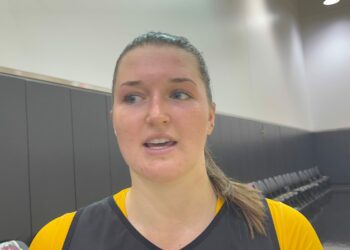The Olympic fun is not over in Paris. Several Iowans are competing in the Paris 2024 Paralympics.
Athletes with Iowa connections recently joined Charity Nebbe on Talk of Iowa to share their journeys to compete on the global stage.
Erin Kerkhoff, track
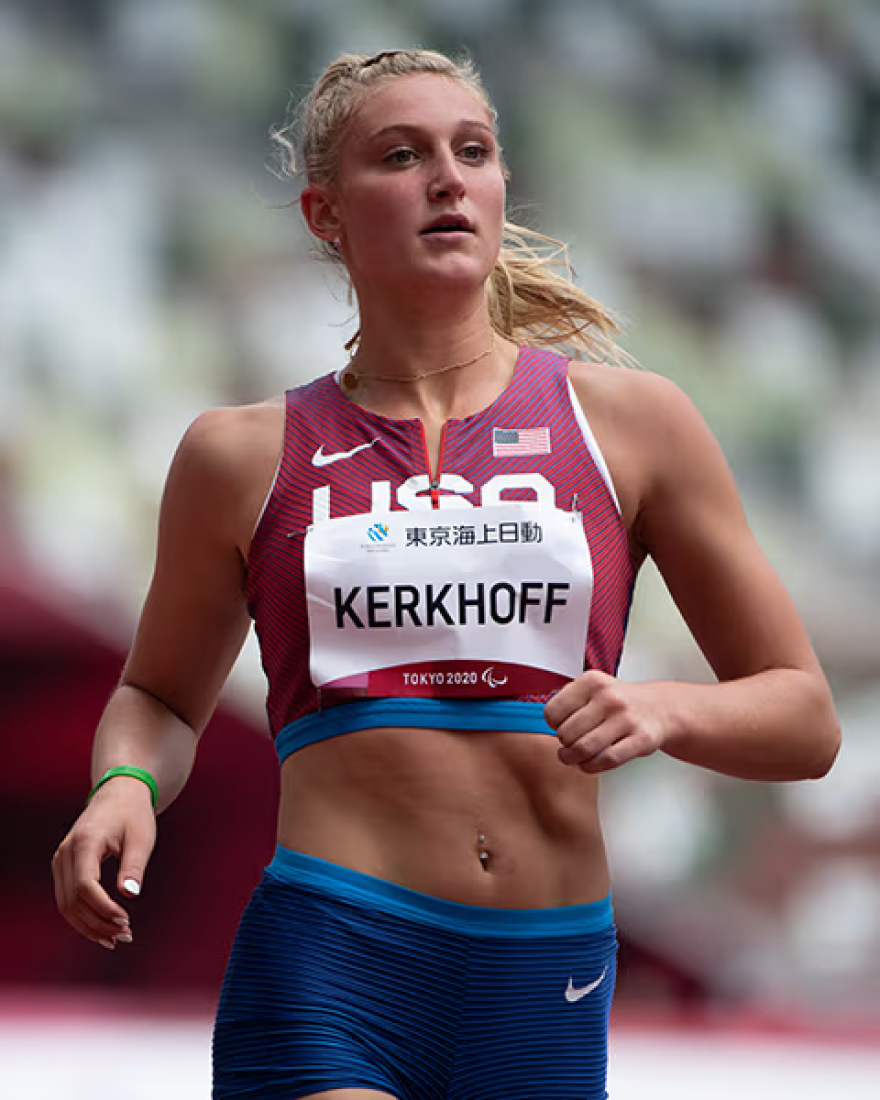
Erin Kerkhoff at the Tokyo Paralympics.
After placing 4th in the World Championship, Erin Kerkhoff, of Coralville, Iowa, is determined to make the podium at this year’s games.
“I’m definitely coming out with like a vengeance, and I want to make a name for myself,” she said.
Kerkhoff has been visually impaired since she was three-years-old, due to optic nerve atrophy. She is competing with other T13 classified athletes who have similar impairments.
“There’s three classifications for vision loss. So T11 is athletes that are completely blind. T12 are athletes that have a vision loss, but they also can have the choice to have a guide runner, so someone that’s like tethered to them. And then T13, which is the classification I’m in, is athletes that have a severe vision loss but do not require a guide athlete.”
Kerkhoff competed in the 2021 Tokyo Paralympics, which she said was amazing, but also stressful because of the pandemic. She is excited to explore Paris and compete with other women from around the world who have similar experiences as her.
“I just have so much respect for them. Honestly, you know, running around the track, and you get done with the race, and I just feel overjoyed. Because I’m just like, I know what they’ve been through, even if it’s different experiences because they’re in different countries. I know they’ve been through some hard times, just like I’ve been through some hard times. And so I think it’s just like such mutual respect, and they’re really fast, so it’s just unbelievable. But there is a little bit of a language barrier. But even with that, I think we all just, you know, learn and just learn to love all of it.”
Jeromie Meyer, wheelchair basketball
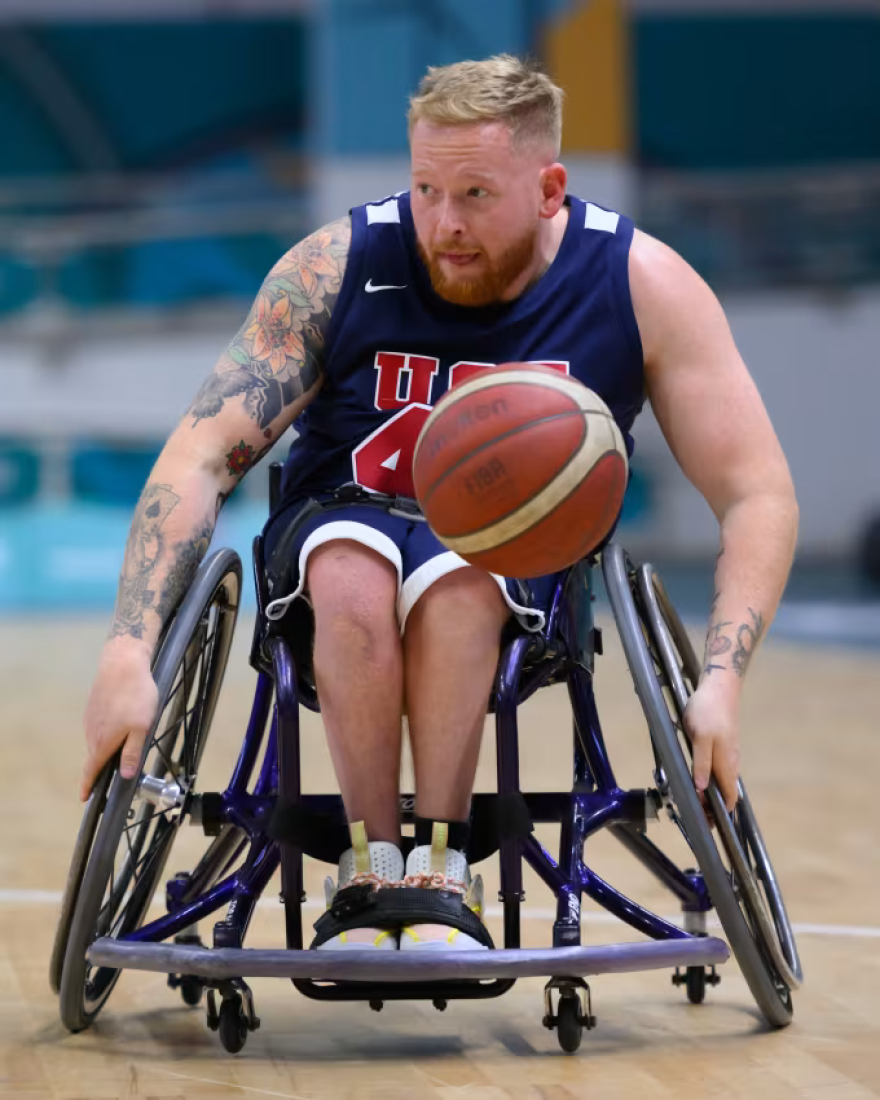
Jeromie Meyer plays wheelchair basketball.
Woodbine native Jeromie Meyer is competing in his first Paralympics this year after helping Team USA win gold at the 2023 World Championships.
Meyer was struck by a drunk driver at 10 years old when he was riding his bike. Due to the accident, he was paralyzed from the hips down. Growing up as a kid in a wheelchair in a small town, Meyer said it was an adjustment for him and his parents, who had memories of him as an able-bodied child. Now, he has spent most of his life in a wheelchair, making new memories.
“In the moment, it was tough, but if you fast forward 17 years later, here we are getting ready to go to Paris,” he said.
Meyer explained some key differences people watching his competition will notice about wheelchair basketball rules.
“We do not have a double dribbling rule. So, I could keep dribbling the ball, pick the ball up, put it on my lap, and then dribble again. And in able-bodied basketball, as soon as you pick your dribble up, you get called for double dribbling. Whereas wheelchair basketball, that is not a rule,” he said. “Also, the traveling rule is a bit different. So in wheelchair basketball, for every two touches or two pushes of my wheels requires one dribble of the basketball.”
He’s currently a graduate student in the higher education leadership program at University of Wisconsin-Whitewater and he graduated from UW-Whitewater with a bachelor’s degree in physical education with minors in recreation, leisure studies and athletic coaching in 2022.
After grad school, he hopes to continue a career in sports that involves being around like-minded people.
He says competing in the Paralympics is one of the greatest honors an individual can have.
“The thing I’m anticipating and looking forward to the most is that first game when your whole roster gets called and you’re sitting out there shoulder to shoulder with your teammates, and you hear the national anthem for the first time with USA across your chest.”
Matt Stutzman, archery
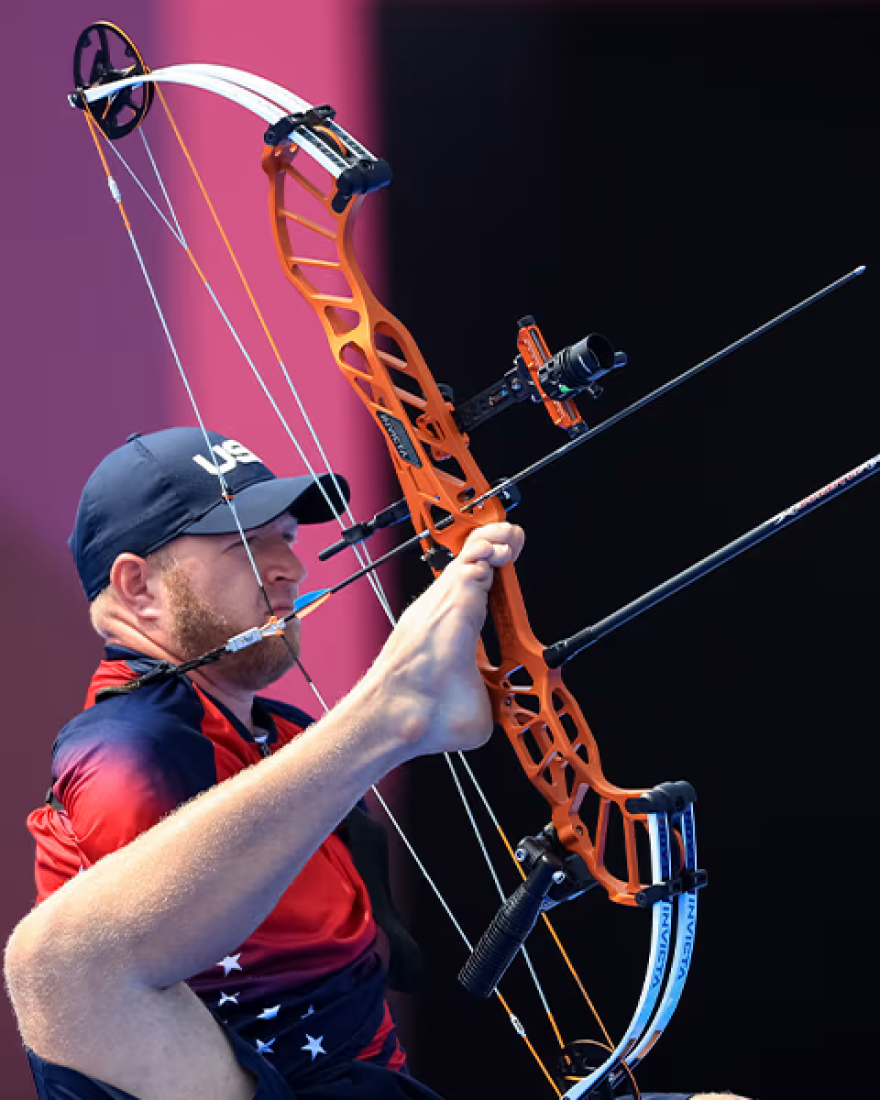
Matt Stutzman shoots a bow from a seated position using his foot.
Fairfield’s “Armless Archer” is going to his 4th Paralympics. Matt Stuzman said this is probably his last Paralympic Games, so he’s bringing his family, including his three sons, to watch him compete in Paris.
Born without arms, Stutzman first began shooting a bow and arrow to bring home food for his family when he struggled to find employment.
He shared how he would be invited to job interviews, but then be dismissed.
“On paper, it looked great, but then once they would see me, they’re like, ‘Oh, you have no arms, you can’t work.’ And then bam, you know, they wouldn’t even give me a chance.” Stutzman said he has seen the general population gain more understanding of disabilities over the years. “And now what you’re seeing is there’s so many people in this world that have physical disabilities that are working in an amazing place. And you’re seeing the awareness now from, you know, 2012 to now, is so much more. People look at people with physical disabilities as people who can do what everybody else can do, even if it’s slightly different, they still know how to work. They still know how to get things done.”
Stutzman said the Paralympic Games have opened people’s eyes to all that people with physical disabilities are capable of.
After taking the silver medal in the 2012 London games, Stutzman had bad luck in Rio and Tokyo with bows breaking and equipment issues impacting his shooting confidence. This time, he says he’s taking plenty of extras and getting mentally prepared.
“I do like to perform. I do like big crowds. You know, that motivates me and gets me excited … Another benefit for me in that aspect of things is that I feel like, you know, all my life, because I’ve had no arms, I’ve had people always like looking and staring and pointing and, you know, all that stuff, because I have been unique. And because of that, I’m able to block it out.”
Jessica Heims, discus
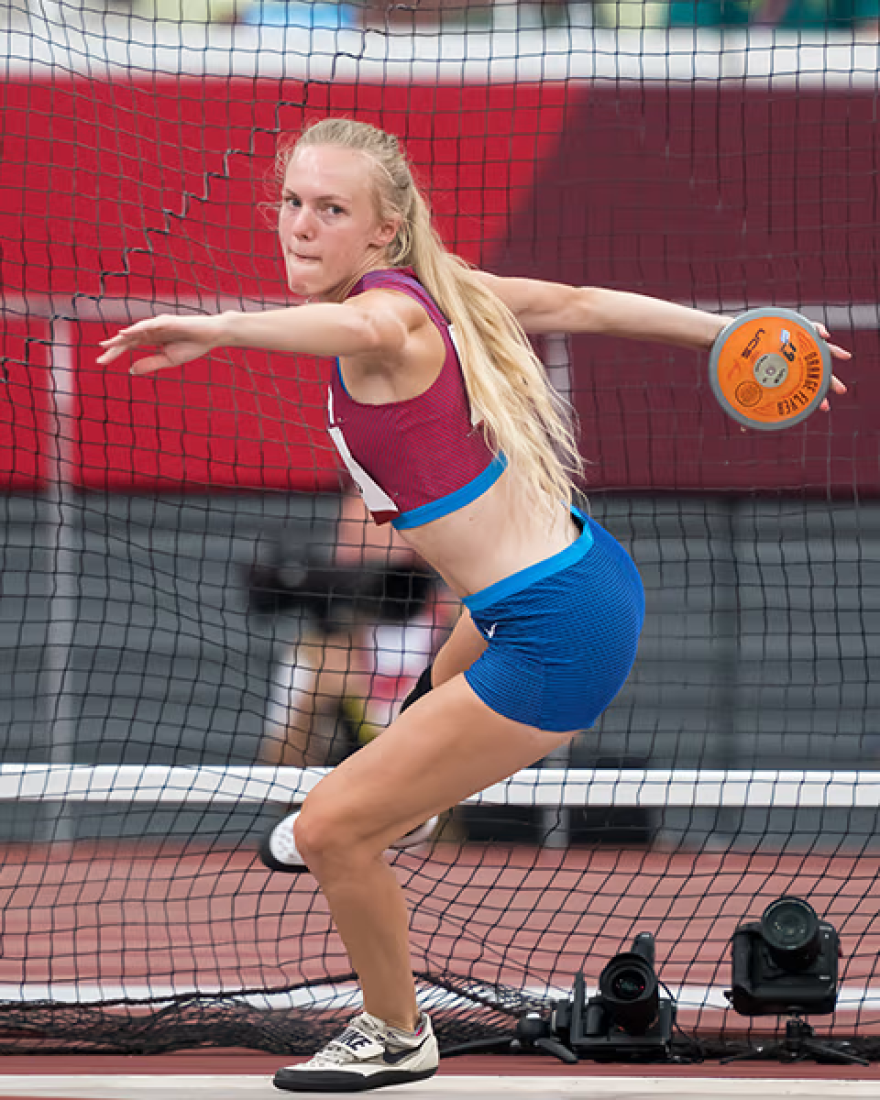
Jessica Heims throws discus.
Jessica Heims began her Paralympic career at 17-years-old when she competed in Rio in 2016. Heims, who had her right leg amputated when she was one, ran the 400m and threw discus in 2016 but since then the 400m track event has been dropped from her disability classification of T64/F64.
“Because there are so many different disabilities, you can’t have every disability, have every single event,” she said. “There will be a billion medals, a billion events, the games will never end. So they separate each classification, then they give like, four or five events to each classification.”
Although it broke her heart not to be eligible for the 400m, Heims said she and other Paralympians are also able to find humor in the situation.
“We like to joke about all the classes. ‘Oh, I wish I was 13 because they have that event. Oh, man, why couldn’t I be missing my arm instead of my leg? I could have been doing this, I want that one,’ so we can’t win them all.”
Outside of focusing on strength work for her discus competition, Heims said she’s looking forward to eating all the crepes she can find and cheering at other events. Athletes weren’t able to watch other competitions during the Tokyo games because of the pandemic. She is most excited about wheelchair rugby.
“That’s a phenomenal event. It is the craziest. It used to be called ‘Murderball’. So if that gives you any indication as to how insane it is — I love that event.”
Olivia Chambers, swimming
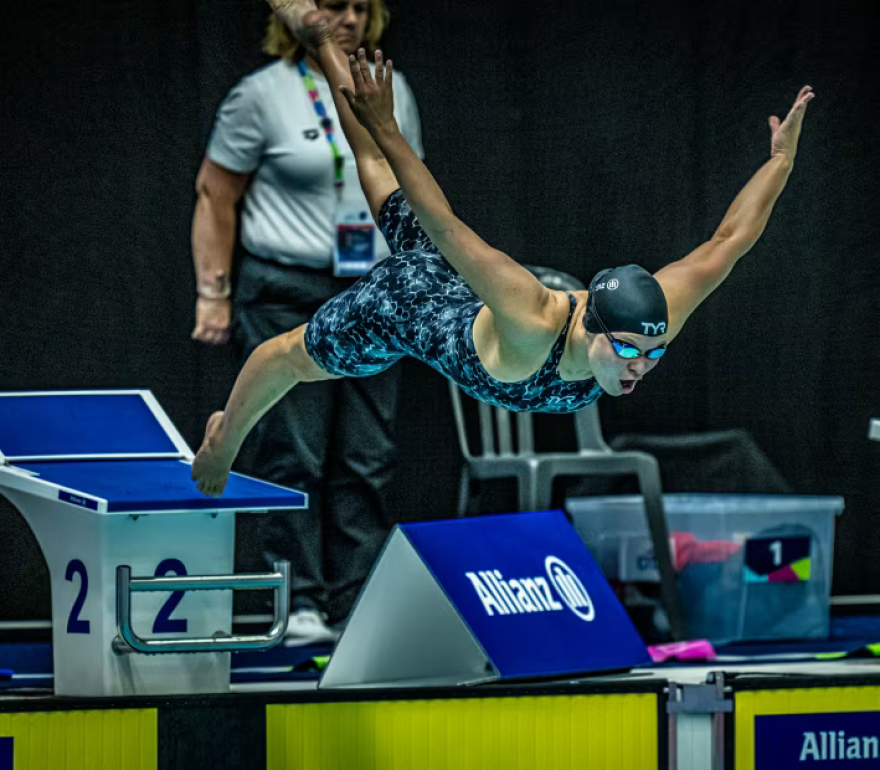
Olivia Chambers dives into a pool.
Olivia Chambers, who swims collegiately for UNI, will be competing in at least five events in Paris.
Chambers began experiencing loss of vision when she was 16-years-old. At the time doctors told her it was a temporary spasm, but she continued to lose more and more of her sight. She still has yet to receive a confirmed diagnosis.
“It was scary, but I just kept swimming, and that’s what kept me going, because I could always swim. I could figure out ways to work around my vision loss, and that’s just how I kept going.”
Chambers learned how to count her strokes to know when she was reaching the end of the pool and needed to turn. Though the loss of sight initially slowed down her race time, she eventually became quicker than she had been before losing vision.
“It means a lot that I’m still able to get out there and swim. And it’s really cool to see that I’m actually becoming faster than what I was before I lost my sight. It just really shows, to me, that I can really do anything I put my mind to, as long as I don’t let it stop me and just keep swimming.”
Justin Phongsavanh, javelin
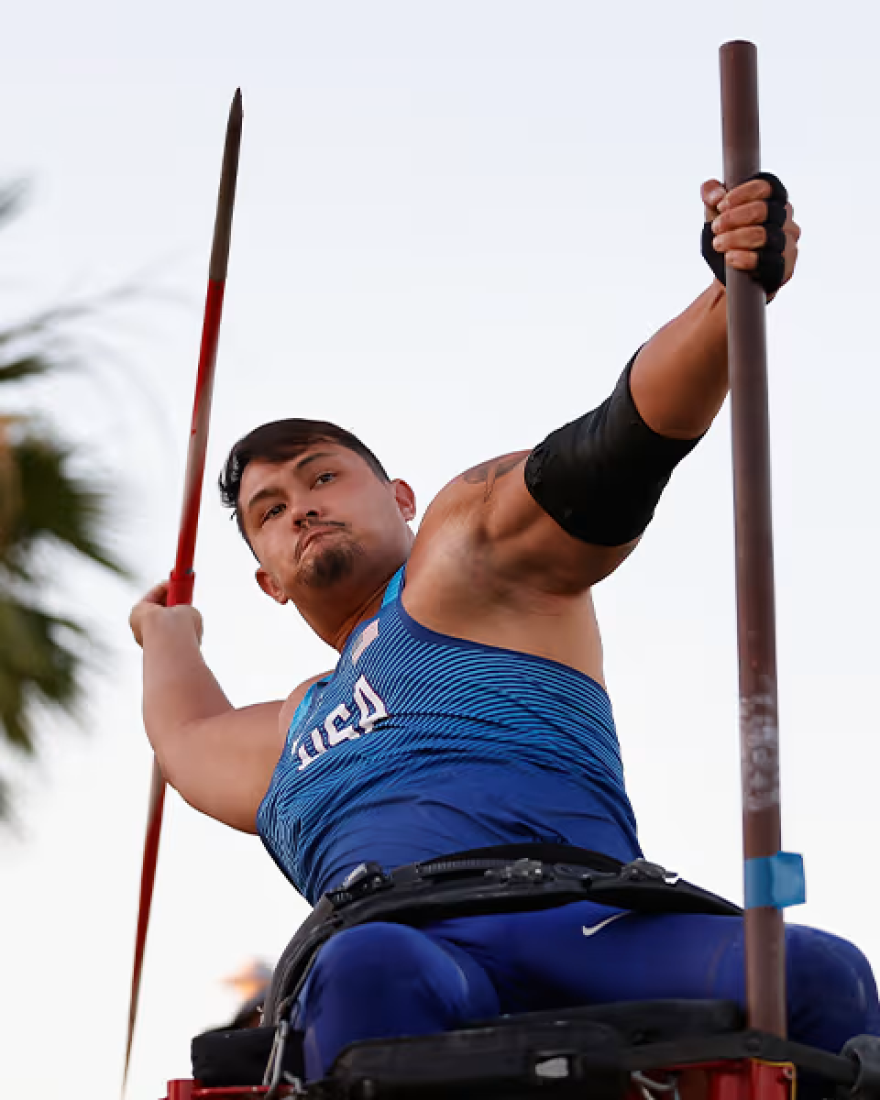
Justin Phongsavanh throws javelin while seated in a wheelchair.
Justin Phongsavanh, from Ankeny, holds the world record in seated javelin throw. He is headed to his second Paralympic Games, after taking home the bronze medal in 2021.
His goal this year is to really be present and take in the first post-COVID Paralympics, while mingling with other adaptive sports athletes.
“When I go to these games and we’re in a village, I’m talking to wheelchair rugby, wheelchair basketball, fencing, goalball. I am communicating with everyone. I’m a certified yapper, and I can talk to anyone and everyone.”
Phongsavanh has been paralyzed from the chest down since being shot in a random violent attack when he was 18-years-old. He says his mom has been his superhero supporting him through his recovery and helping him to adjust to his new reality.
Now 27, Phongsavanh has two MBA degrees and wants to start a nonprofit to provide custom-fitted wheelchairs.
“The wheelchair is the depiction of a person, and it’s an extension of them. And if a wheelchair doesn’t fit right, it limits your life and what you can do and where you can go. And so to be able to provide wheelchairs that are custom fit to individuals, not only gives them longevity of their life and their health, but also gives them the ability to break barriers and go out and do things and normalize seeing more people in wheelchairs outside, so it doesn’t seem like it’s so foreign.”
To listen to the interviews with these athletes and other Iowa cultural conversations, listen to Talk of Iowa, hosted by Charity Nebbe. Samantha McIntosh produced these episodes.
Source link : http://www.bing.com/news/apiclick.aspx?ref=FexRss&aid=&tid=66d7547bc9e943639377878c2f44821e&url=https%3A%2F%2Fwww.iowapublicradio.org%2Farts-life%2F2024-09-03%2Fmeet-the-paralympians-from-iowa&c=4623861244266879643&mkt=en-us
Author :
Publish date : 2024-09-03 06:21:00
Copyright for syndicated content belongs to the linked Source.


